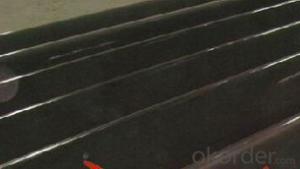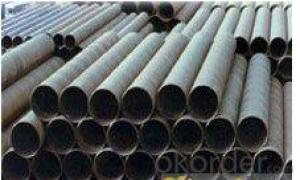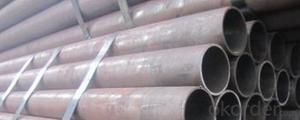Schedule 40 Seamless Carbon Steel Pipe A335P91 CNBM
- Loading Port:
- Qingdao
- Payment Terms:
- TT OR LC
- Min Order Qty:
- 10 pc
- Supply Capability:
- 30 pc/month
OKorder Service Pledge
OKorder Financial Service
You Might Also Like
Quick Details
| Thickness: | 1.73 - 59.54 mm | Section Shape: | Round | Outer Diameter: | 10.3 - 914.4 mm |
| Secondary Or Not: | Non-secondary | Application: | Fluid Pipe | ||
| Technique: | Hot Rolled | Certification: | API | Surface Treatment: | Galvanized,vanish covering, black painting, galvenized ect. |
| Special Pipe: | API Pipe | Alloy Or Not: | Non-alloy | Length: | 5-12m as per customer's requirements |
| SCH: | SCH10~160, STD, XS & XXS | Payment Terms: | L/C T/T | Supply Ability: | 5000 Ton/Tons per Week |
| Product: | pipe prices | Grade: | 10#,20#,45#,A106(B,C),A53(A,B),12Cr1MoV,12Cr1MoVG,12Cr2Mo,13CrMo44,13CrMo45,15CrMo,15CrMoG,St52,St52.4,10#-45#,A53-A369,Cr-Mo alloy,ST35-ST52 | Standard: | API 5CT,API 5L,ASTM A106-2006,ASTM A53-2007,DIN 17175,GB 3087-1999,GB 5130,GB 6479-2000,GB 9948-2006,GB/T 17396-1998,GB/T 5312-1999,GB/T 8162-1999,GB/T 8163-1999,API,ASTM,DIN,GB |
Packaging & Delivery
| Packaging Detail: | By bundles, seaworthy wooden cases, steel framed cases, and simple packaging or according to the demand of the customers. |
| Delivery Detail: | within 5-15 days |
Specifications
1.pipe prices
2.Supply Ability:5000 Tons per Week
3.Payment Terms:L/C T/T
High quality Carbon steel pipe, Best pipe prices
1) Application: Overheat pipe for low and mediumpressure boiler,boiling water pipe, locomotive smoke pipe(big and small),Carry gas ,water or oil in the industries of petroleum and natural gas etc
2) Materials: 10#, 20#, 45#, 15CrMo, 12Cr1MoV, 13CrMo44, 12Cr2Mo, 13CrMo45, 12Cr1MoVG, 15CrMoG, API J55, API K55, API N80, API L80, API P110
3)Pipe according to standard: GB 3087-1999, GB/T 8163-1999, GB/T 8162-1999, GB 9948-2006, GB/T 17396-1998, GB/T 5312-1999, GB 6479-2000, GB 5130, DIN 17175, API 5CT, API 5L .
4)Packing: By bundles, seaworthy wooden cases, steel framed cases, and simple packaging or according to the demand of the customers.
Technical Parameters of Seamless Steel Pipe
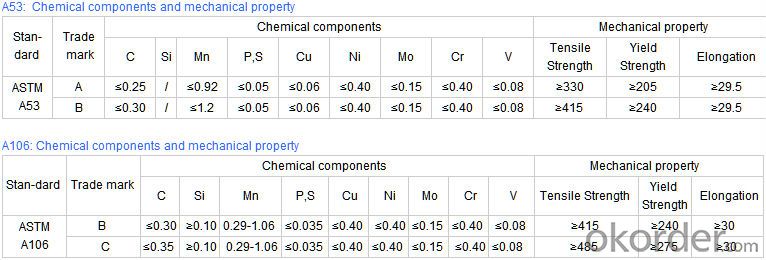
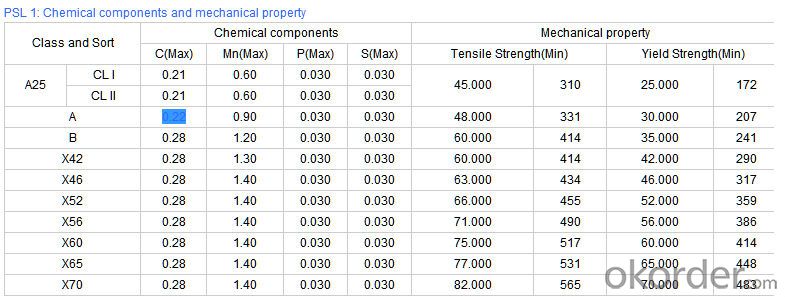
- Q:What is the difference between hot-dip galvanizing and electroplating of steel pipes?
- Steel pipes can be protected from corrosion using two different methods: hot-dip galvanizing and electroplating. To protect steel pipes using hot-dip galvanizing, they are immersed in a molten bath of zinc. The zinc reacts with the steel to create a strong and uniform coating that effectively prevents corrosion. This method is commonly used for outdoor applications and in harsh environments where the pipes are exposed to water or chemicals. In contrast, electroplating involves depositing a thin layer of metal, usually zinc, onto the surface of the steel pipes using an electric current. The steel pipes act as the cathode, and a zinc anode is placed in a solution containing zinc ions. The electric current causes the zinc ions to react with the steel and form a thin coating. Electroplating is often chosen for indoor applications or when aesthetics are a priority. Hot-dip galvanizing generally provides a thicker and more durable coating compared to electroplating. The hot-dip galvanized coating is several times thicker than the electroplated zinc coating, offering better corrosion protection and a longer lifespan for the pipes. The appearance of the coatings also differs. Hot-dip galvanizing results in a matte gray finish, while electroplating can give a more lustrous and shiny appearance. Cost-wise, hot-dip galvanizing is more cost-effective for larger projects because it can coat multiple pipes simultaneously. On the other hand, electroplating is usually more expensive and time-consuming, especially for larger quantities of steel pipes. Ultimately, the choice between hot-dip galvanizing and electroplating depends on the specific requirements of the project, including the intended application, environment, aesthetics, and budget constraints.
- Q:How do steel pipes differ from other types of pipes?
- Steel pipes possess several distinct characteristics that set them apart from other pipe types. Primarily, their strength and durability are well-known. They exhibit remarkable resistance to heat, pressure, and corrosion, rendering them suitable for numerous applications. Additionally, their robustness allows them to bear heavy loads and offer an extended service life. One distinguishing feature of steel pipes lies in their versatility. They can be manufactured in various shapes and sizes to fulfill specific project requirements. This adaptability has contributed to their popularity across a diverse range of industries, including construction, oil and gas, water treatment, and manufacturing. Moreover, steel pipes exhibit exceptional thermal conductivity, facilitating efficient heat transfer between different areas. Consequently, they prove suitable for applications involving heating and cooling systems, as well as the transportation of hot fluids or gases. Furthermore, steel pipes are renowned for their resistance to fire. They possess a high melting point and are not easily ignited or conducive to the spread of flames. This characteristic is particularly critical in applications where fire safety is a concern, such as buildings or industrial facilities. Lastly, although steel pipes may entail a higher initial cost compared to other pipe types, their long-term benefits, such as durability and low maintenance requirements, often outweigh the initial investment. Additionally, steel pipes are highly recyclable, making them an environmentally friendly choice. In summary, steel pipes stand out due to their strength, durability, versatility, excellent thermal conductivity, fire resistance, and recyclability. These remarkable qualities establish steel pipes as the preferred option for a wide range of applications across various industries.
- Q:What's the difference between a rectangular tube and a rectangular steel tube?
- No difference, but your name is different, rectangular steel pipe, but can be divided into seamless rectangular steel pipe and welded rectangular, these two, in the material will also have a difference, I do not know how to help you
- Q:How are steel pipes used in sewage systems?
- Steel pipes are commonly used in sewage systems due to their durability and strength. They are used to transport sewage from homes, buildings, and industries to treatment plants or disposal sites. The corrosion-resistant properties of steel make it an ideal material for sewage systems, ensuring longevity and preventing leaks. Additionally, steel pipes can withstand high pressure and heavy loads, making them suitable for underground installations.
- Q:Are steel pipes resistant to chemicals?
- Yes, steel pipes are generally resistant to chemicals. However, their resistance can vary depending on the specific chemicals involved and the type of steel used. It is important to consider the chemical composition and temperature of the substances being transported, as well as any potential corrosive effects, to ensure the appropriate choice of steel pipe material.
- Q:What are the different types of steel pipe fittings for chemical processing plants?
- There are various types of steel pipe fittings commonly used in chemical processing plants, such as elbows, tees, reducers, couplings, flanges, and valves. These fittings are designed to connect and redirect the flow of fluids within the piping system, ensuring efficient and safe operation in chemical processing applications.
- Q:How are steel pipes used in the renewable energy sector?
- Steel pipes are commonly used in the renewable energy sector for various purposes, primarily in the construction and installation of infrastructure for wind and solar energy projects. Steel pipes are used to support and anchor wind turbine towers, as well as to transport compressed air or hydraulic fluid for the operation of wind turbines. They are also utilized in the construction of solar panel frameworks, providing stability and durability. Additionally, steel pipes are used in geothermal energy projects for the extraction and transportation of hot water or steam from underground sources to power plants. Overall, steel pipes play a crucial role in enabling the efficient and reliable operation of renewable energy systems.
- Q:What are the different types of steel pipes available in the market?
- There are several different types of steel pipes available in the market, each designed for specific purposes and applications. Some of the most common types include: 1. Carbon Steel Pipes: These are the most widely used type of steel pipes, known for their strength and durability. They are primarily used for transporting fluids and gases in various industries such as oil and gas, construction, and plumbing. 2. Alloy Steel Pipes: These pipes are made by combining different metals, such as chromium, nickel, or molybdenum, with carbon steel. Alloy steel pipes offer enhanced strength, corrosion resistance, and heat resistance. They are often used in high-pressure applications, such as in power plants and chemical plants. 3. Stainless Steel Pipes: Stainless steel pipes are highly resistant to corrosion and oxidation, making them suitable for applications where hygiene and durability are crucial. They are commonly used in industries like food processing, pharmaceuticals, and water treatment. 4. Galvanized Steel Pipes: These pipes are coated with a layer of zinc to protect them from rust and corrosion. Galvanized steel pipes are commonly used in plumbing systems and outdoor structures, such as fences and handrails. 5. Seamless Steel Pipes: Seamless pipes are produced without any welding or joints, resulting in a smooth and continuous surface. They are known for their high strength and are often used in high-pressure applications. 6. Welded Steel Pipes: Welded pipes are made by rolling or bending a flat steel plate into a cylindrical shape and then welding the edges together. They are commonly used in industries such as construction, oil and gas, and automotive. 7. ERW (Electric Resistance Welded) Steel Pipes: ERW pipes are made by passing a high-frequency electrical current through the steel strip, causing it to heat and form a weld. They are widely used in various applications, including plumbing, water wells, and structural support. 8. LSAW (Longitudinal Submerged Arc Welded) Steel Pipes: LSAW pipes are made by bending and welding steel plates into a cylindrical shape. They are commonly used for transporting large volumes of oil, gas, or water over long distances. These are just a few examples of the diverse range of steel pipes available in the market. The choice of the right type of steel pipe depends on factors such as the intended application, environmental conditions, and budget considerations. It is important to consult with experts or professionals to determine the most suitable type of steel pipe for a specific project or application.
- Q:How to make the steel pipe spray paint is not easy to fall off?
- First, clean the surface of the object to be sprayed (pay attention to whether or not to paint off, which is the key):Remove rust stains, oil and so on, when spraying, the nozzle and spray the best distance is 20cm, should be two times forming, first thin spray again, dry, and then spray second times, this is more uniform, and not easy to hang
- Q:Can steel pipes be used in the oil and gas industry?
- Indeed, the oil and gas industry commonly utilizes steel pipes. Renowned for their robustness, longevity, and resistance to corrosion, steel pipes are well-suited for the transportation and storage of diverse fluids and gases within this sector. They possess the ability to endure high pressure and extreme temperatures, which are frequently encountered during oil and gas operations. Moreover, the ease with which steel pipes can be welded together facilitates efficient assembly and maintenance. Consequently, steel pipes represent a dependable and economically sound option for the oil and gas industry.
1. Manufacturer Overview |
|
|---|---|
| Location | |
| Year Established | |
| Annual Output Value | |
| Main Markets | |
| Company Certifications | |
2. Manufacturer Certificates |
|
|---|---|
| a) Certification Name | |
| Range | |
| Reference | |
| Validity Period | |
3. Manufacturer Capability |
|
|---|---|
| a)Trade Capacity | |
| Nearest Port | |
| Export Percentage | |
| No.of Employees in Trade Department | |
| Language Spoken: | |
| b)Factory Information | |
| Factory Size: | |
| No. of Production Lines | |
| Contract Manufacturing | |
| Product Price Range | |
Send your message to us
Schedule 40 Seamless Carbon Steel Pipe A335P91 CNBM
- Loading Port:
- Qingdao
- Payment Terms:
- TT OR LC
- Min Order Qty:
- 10 pc
- Supply Capability:
- 30 pc/month
OKorder Service Pledge
OKorder Financial Service
Similar products
New products
Hot products
Related keywords
